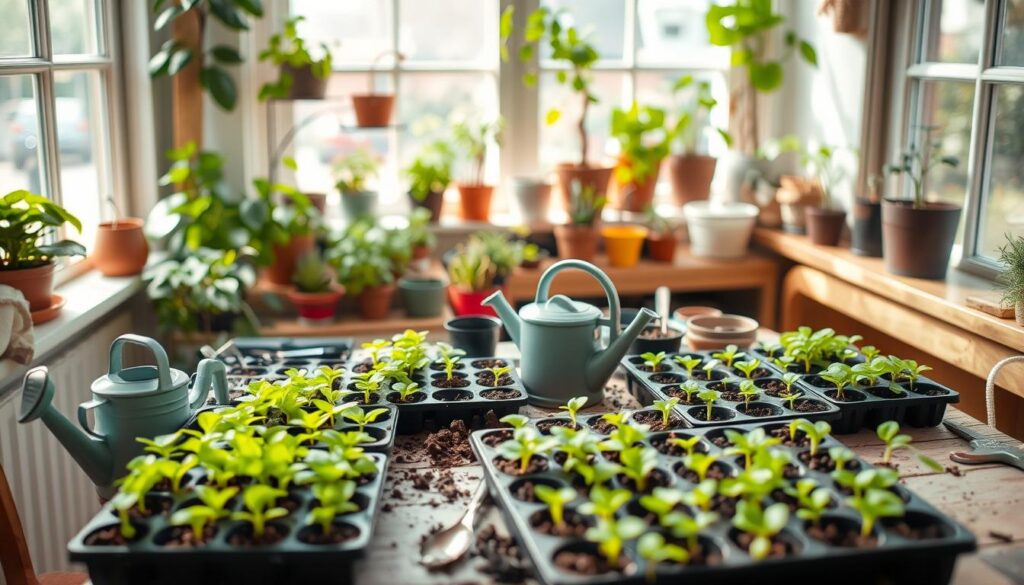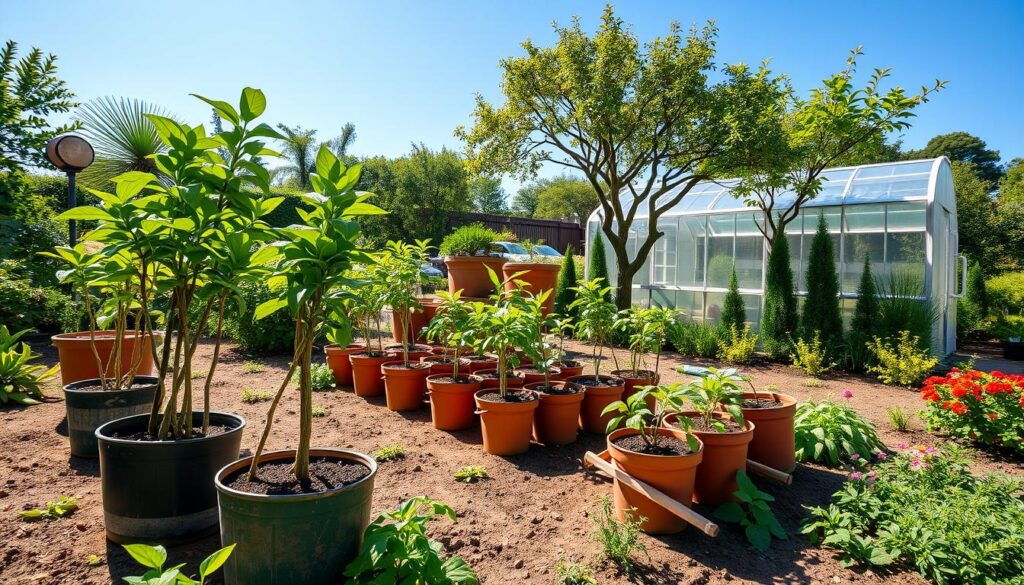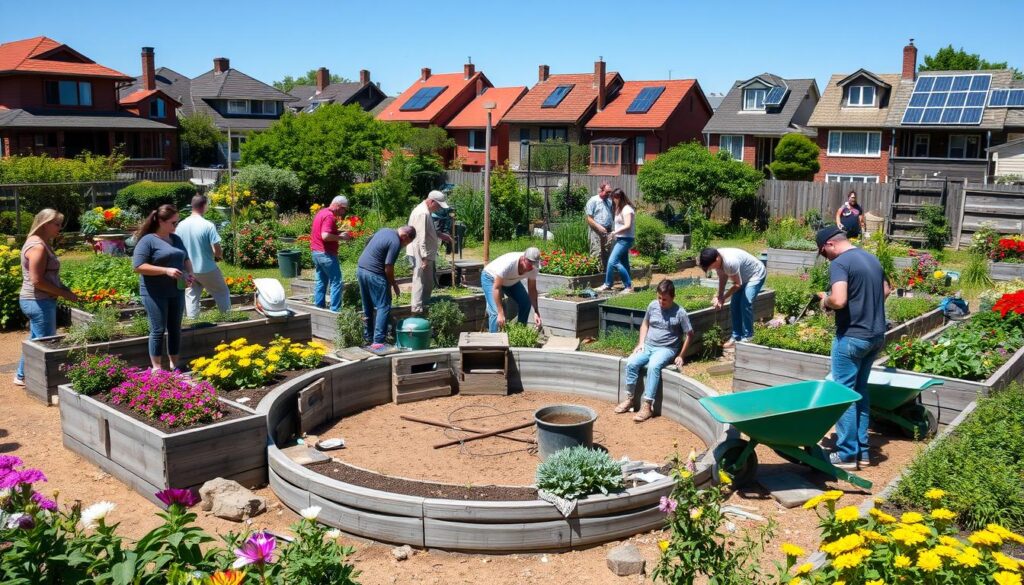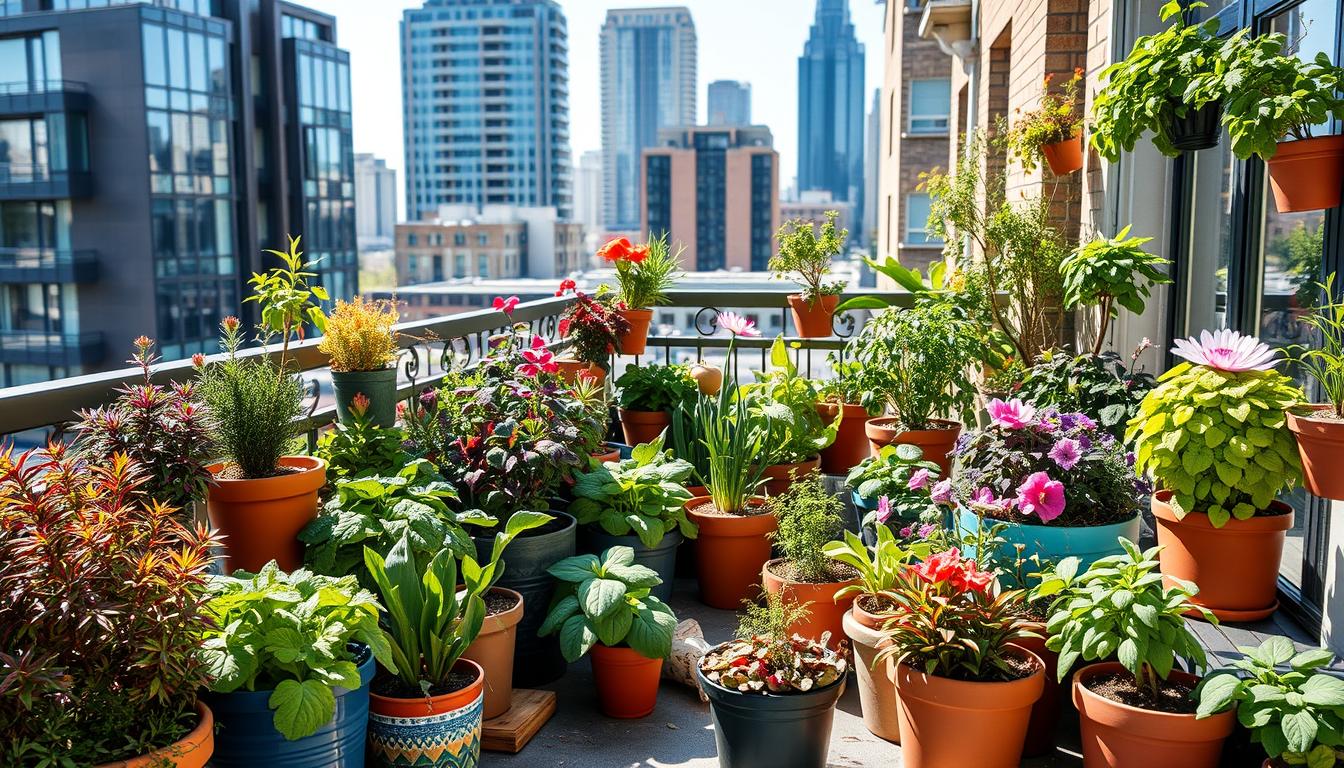As a renter, you might have thought it impossible to turn your space into a green oasis. But, there are creative, non-permanent permaculture designs for you. You can grow your own food and enjoy a beautiful garden, even in a small rented area. This article will show you how to make your rented space a garden paradise.
Key Takeaways
- Explore the potential of container gardening to grow a wide variety of edibles, even in small spaces.
- Discover the joys of dwarf fruit trees and how they can thrive in rented environments.
- Learn the art of seed starting and propagation to build a sustainable garden for the future.
- Uncover the power of community-based initiatives like Landshare and Permablitz to unlock new gardening possibilities.
- Dive into the world of hot composting and raspberry cultivation to enrich your soil and palate.
Container Gardening: The Renter’s Key to Abundant Harvests
For urban gardeners and renters, container gardening is a great way to grow many types of food. You can use old filing cabinets, boots, or even karaoke machines as planters. This method lets you take your garden with you when you move, spreading the love of permaculture.
Unleashing Creativity in Container Selection
Don’t just stick to traditional pots. Use recycled containers like old boots or karaoke machines. Growing herbs and salads in these unique containers adds fun to your garden. It also makes the most of your space.
Grow Herbs, Salads, and Small Fruits/Veggies with Ease
Choose the right containers and growing methods for a bountiful harvest. Herbs, leafy greens, and small fruits and veggies do well in containers. This makes them perfect for apartment gardening and balcony gardens. Enjoy fresh, homegrown produce right from your kitchen.
| Container Size | Recommended Crops |
|---|---|
| 40cm pots | Tomatoes |
| 50cm+ pots | Fruit trees |
| Saucers under pots | Helps with water runoff |
| Confined spaces | Raspberries (to prevent runners) |
| Pots with good drainage | Blueberries |
With a bit of creativity and the right containers, renters can enjoy the benefits of container gardening. They can grow food in even the smallest spaces.
Dwarf Fruit Trees: Portable Orchards for Renters
You don’t need a lot of land to grow your own fruit trees. Dwarf fruit trees do well in containers. This lets renters create portable orchards that can move with them. These small trees bring the joy of growing your own food without needing to plant in the ground.
Start your fruit trees during your rental to get a head start. This way, you’ll have a fruitful garden ready when you find your dream home. Dwarf fruit trees, like dwarf apple and dwarf stone fruit, are great for container gardening and urban orchards.
These small-space farming wonders can grow in potted fruit trees as small as 15 gallons. You can create a mini orchard on your balcony or patio. With the right care, these trees can thrive and give you a lot of fruit. This lets you enjoy the taste of your future while using your limited rental space well.
| Dwarf Fruit Tree Varieties | Recommended Container Size | Estimated Mature Height |
|---|---|---|
| Dwarf Apple | 15-20 gallons | 12-15 feet |
| Dwarf Peach | 15-20 gallons | 8-10 feet |
| Dwarf Cherry | 10-15 gallons | 8-12 feet |
With a bit of creativity and planning, renters can turn their small outdoor spaces into portable orchards. This sets the stage for a fruitful future, no matter where life takes you.
“80% reduction in the need for pruning reported by Stefan Sobkowiak after implementing training techniques on fruit trees.”
Seed Starting and Propagation: Learning for the Future
Renting doesn’t limit your gardening dreams. It’s a chance to learn important permaculture skills like seed starting and plant propagation. These skills help you grow organic seedlings for your container gardens. They also prepare you for gardening on your own land someday.
Master the Art of Seed Starting
Seed starting is easy and cheap. You just need a few things like seed trays, soil, and water. Try using toilet rolls as seed starters. It’s good for the planet and helps your seedlings grow strong before they go into your container gardens.
Experiment with Propagation Techniques
Propagation means making new plants from parts of old ones. Try stem cuttings, root division, or air layering to grow more plants. This way, you can share your gardening knowledge with others.
“Seed starting and propagation are empowering skills that can transform your renter’s garden into a thriving oasis, while also preparing you for the day when you have your own land to steward.”

| Seed Starting Supplies | Propagation Techniques |
|---|---|
|
|
Starting seeds and propagating plants as a renter opens up many possibilities. You’ll have a constant supply of organic seedlings for your container gardens. You’ll also learn skills that will help you when you have your own garden.
Observation and Communion: Connecting with Nature
As avid permaculture practitioners, it’s key for renters to connect deeply with nature. Skills like container gardening, seed starting, and fruit tree propagation are important. But, true permaculture goes beyond these skills.
Take time each day to observe your surroundings. Note changes in weather, wildlife, and “weeds” in a notebook. Don’t analyze or plan. Just be present and in communion with your environment. This practice will deepen your understanding of the land.
“Permaculture is seen by Laura as spirituality in action, reflecting principles of present moment awareness, connection, and balance.”
Slow down as daylight turns to nighttime. Prepare physically and mentally for a retreat into nature. Set goals, meditate, and consider your needs before starting.
Let your intuition guide you on your nature connection journey. Drop your agendas and listen to the land’s messages. This approach will make your permaculture practice richer and your space more welcoming.
Tree Propagation: Preparing for Your Future Eden
As a renter, you might dream of having your own garden. But why wait? Start tree propagation and plant propagation now. This will help you build a future edible landscape.
Take cuttings from fruit and nut trees, or buy bulk pioneer tree seeds. This will save you money and let you watch your trees grow. You can then plan your container gardening and sustainable living setup.
With patience and basic techniques, you can grow your own orchard. Even as a renter, you can start planning today. This will bring you closer to your dream permaculture paradise.
“In the long run, we shape our lives, and we shape ourselves. The process never ends until we die. And the choices we make are ultimately our own responsibility.” – Eleanor Roosevelt
Start now, whether from cuttings or seeds. Try different methods, keep records, and learn from your experiences. With care, your tree propagation will flourish in the future.

As a renter, you might not plant a permanent orchard. But don’t let that stop you. Use container gardening and tree propagation to create a portable edible landscape. It will be ready to move when the time comes.
Landshare: Unlocking Unused Land for Gardening
Don’t let not having a garden stop you. Landshare connects landowners with gardeners. Reach out to local councils or groups to find unused land for productive gardens. This way, you can grow more and help build urban communities that rely on themselves.
Worldwide, landshare projects are changing lives. In the UK and Australia, over 1,000 people have joined landshare programs. They’ve turned empty spaces into community gardens. In Melbourne, the 3000acres project is making food growing normal. In the USA, Shared Earth helps with food production and healthy food access.
Landshare programs offer land for personal, semi-commercial, or commercial urban gardening. This flexibility helps people grow food in ways that fit their needs. As food costs soar, these projects are a smart way to live sustainably.
| Location | Landshare Initiative | Impact |
|---|---|---|
| UK & Australia | Landshare | Over 1,000 participants |
| Melbourne, Australia | 3000acres | Transforming underutilized urban land into productive open spaces |
| USA | Shared Earth | Supporting local food production and access to healthy food |
By using landshare, renters and city folks can make a difference. They can start sustainable living practices and connect with the land. Start looking for unused land in your area. You might find your next garden spot.
Permablitz: Community Transformation with Permaculture
Renters looking to live sustainably have a great tool: the Permablitz. It’s a community event where people come together to turn a space into a permaculture system. Whether you know a lot or a little about permaculture, joining a Permablitz is a great way to learn and help your community.
The Permablitz movement is all about working together and sharing. These events are free, with free workshops and food for everyone. To host a Permablitz, you need to attend a few first. This helps the community grow stronger as more people join and share their skills.
The Permablitz Melbourne Designers Guild has almost 200 Permaculture Design Certificate graduates. The Permablitz Melbourne Collective helps organize these events, connecting hosts and designers. Everyone involved has a great experience. Remember to RSVP to the host because spots are limited.
“The term ‘permaculture’ was coined in the 1970s by Australians Bill Mollison and David Holmgren. Permaculture food systems work more like natural systems such as forests than industrial agriculture, requiring no artificial inputs.”
If there’s no Permablitz in your area, you can start one. By working together, you can make your rented garden a reality. This helps make your community more sustainable for everyone.

Permaculture design brings people and places together in harmony. It focuses on water, energy, waste, and more. The Transition Towns movement grew from permaculture. There are many permaculture examples in the U.S. to inspire you.
Hot Composting: Sustainable Soil Enrichment
As a renter, starting a garden can seem hard. But hot composting is a simple way to make your soil better. It turns kitchen scraps and yard waste into “black gold” for your plants.
Hot composting, or the Berkeley method, makes great compost in 18 days. It keeps the compost hot, around 131-149°F (55-65°C). This makes it full of good microbes and nutrients for your plants.
It’s better than cold composting because it keeps more carbon and nitrogen. This means up to 80% of the original material stays in the compost. It’s great for renters with little space.
To start, use the “One Bucket Greens, Two Buckets Browns” method. Mix one-third nitrogen-rich stuff like grass clippings with two-thirds carbon stuff like wood chips. This keeps the compost healthy and growing.
Hot composting lets you use many organic materials, like bones and wool. It turns them into rich soil for your garden. Start hot composting to make your garden better, no matter how small your space is.
| Composting Material | C:N Ratio |
|---|---|
| Wood chips | 400:1 |
| Grass clippings | 20:1 |
| Horse manure | 18:1 |
| Coffee grounds | 20:1 |
Raspberry Canes in Containers: Sweet Delights
Enjoying homegrown berries is possible even without a big garden. Raspberry canes can grow well in containers. This lets renters grow these tasty plants on balconies or patios. You can have a summer full of fresh berries without needing a big garden.
Container gardening is great for adding edible plants to your living space. Raspberry canes add color and sweet berries to small areas. They can turn a tiny spot into a lush, fruitful garden. You can use wooden planters or old containers, and still get lots of berries.
Raspberry canes in containers are very flexible. They don’t need a lot of room and can be moved to get more sun. This is perfect for city gardeners or renters with small outdoor spaces. With some care, your raspberry canes will give you plenty of fresh berries all summer.
If you rent and want to grow your own food, try raspberry canes in containers. Create your own edible garden and enjoy the fruits of your labor. With a bit of creativity and the right container, you can pick your own raspberries right at home.
permaculture for renters: Unleash Your Green Thumb
Even if you rent, permaculture lets you create lush, self-sustaining gardens. You can grow a lot in small spaces with creative designs. This way, you can enjoy a bountiful harvest, no matter the size of your living area.
Container gardening is a great start for permaculture for renters. You can grow everything from herbs to small fruits and veggies in the right containers. Get creative with your containers, like old planters or hanging baskets.
Dwarf fruit trees are perfect for renters wanting more. These small trees grow well in big pots. They let you have your own orchard, even in small spaces.
Living sustainably as a renter means thinking ahead. Learning to start seeds and grow new plants helps you keep your garden going. This way, you can always have fresh produce.
By following permaculture for renters, you can turn any place into a green oasis. It’s all about being creative and caring for the earth. With a little effort, your urban garden can flourish.
| Permaculture Principle | Renter-Friendly Application |
|---|---|
| Container Gardening | Grow herbs, salads, and small fruits/veggies in a variety of repurposed containers |
| Dwarf Fruit Trees | Cultivate a portable orchard in large pots or planters |
| Seed Starting and Propagation | Develop a self-sustaining cycle of growth by growing your own seedlings and cuttings |
| Community Initiatives | Participate in permablitz events and landshare programs to access and cultivate unused land |
“The key to successful permaculture for renters is to approach your temporary living space as an opportunity to learn, experiment, and lay the groundwork for your permanent permaculture paradise.”
Conclusion: Embracing Renter’s Paradise
As a renter, you might think you can’t start your permaculture journey. But with creativity and a willingness to try new things, you can turn your rental into a lush, self-sustaining space. Use container gardens, dwarf fruit trees, and seed starting to grow your own food. Connect with nature and join community projects to make a big impact.
Permaculture is about more than just the land. It’s about your connection to nature and living sustainably. So, embrace your rental space and watch your gardening skills grow. This will help you build a strong foundation for your future permaculture dreams.
With a bit of creativity and a love for the environment, you can create a lively garden, even in a small rental. Discover the secrets of designing for renters and live a more eco-friendly life. This will help you build a better future for all of us.

